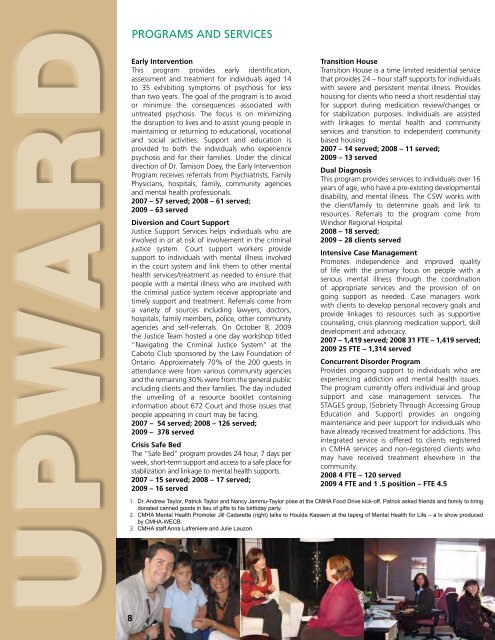2009/10 ANNUAL REPORT - Canadian Mental Health Association
2009/10 ANNUAL REPORT - Canadian Mental Health Association
2009/10 ANNUAL REPORT - Canadian Mental Health Association
Create successful ePaper yourself
Turn your PDF publications into a flip-book with our unique Google optimized e-Paper software.
UPWARD<br />
Programs and Services<br />
Early Intervention<br />
This program provides early identification,<br />
assessment and treatment for individuals aged 14<br />
to 35 exhibiting symptoms of psychosis for less<br />
than two years. The goal of the program is to avoid<br />
or minimize the consequences associated with<br />
untreated psychosis. The focus is on minimizing<br />
the disruption to lives and to assist young people in<br />
maintaining or returning to educational, vocational<br />
and social activities. Support and education is<br />
provided to both the individuals who experience<br />
psychosis and for their families. Under the clinical<br />
direction of Dr. Tamison Doey, the Early Intervention<br />
Program receives referrals from Psychiatrists, Family<br />
Physicians, hospitals, family, community agencies<br />
and mental health professionals.<br />
2007 – 57 served; 2008 – 61 served;<br />
<strong>2009</strong> – 63 served<br />
Diversion and Court Support<br />
Justice Support Services helps individuals who are<br />
involved in or at risk of involvement in the criminal<br />
justice system. Court support workers provide<br />
support to individuals with mental illness involved<br />
in the court system and link them to other mental<br />
health services/treatment as needed to ensure that<br />
people with a mental illness who are involved with<br />
the criminal justice system receive appropriate and<br />
timely support and treatment. Referrals come from<br />
a variety of sources including lawyers, doctors,<br />
hospitals, family members, police, other community<br />
agencies and self-referrals. On October 8, <strong>2009</strong><br />
the Justice Team hosted a one day workshop titled<br />
“Navigating the Criminal Justice System” at the<br />
Caboto Club sponsored by the Law Foundation of<br />
Ontario. Approximately 70% of the 200 guests in<br />
attendance were from various community agencies<br />
and the remaining 30% were from the general public<br />
including clients and their families. The day included<br />
the unveiling of a resource booklet containing<br />
information about 672 Court and those issues that<br />
people appearing in court may be facing.<br />
2007 – 54 served; 2008 – 126 served;<br />
<strong>2009</strong> – 378 served<br />
Crisis Safe Bed<br />
The “Safe Bed” program provides 24 hour, 7 days per<br />
week, short-term support and access to a safe place for<br />
stabilization and linkage to mental health supports.<br />
2007 – 15 served; 2008 – 17 served;<br />
<strong>2009</strong> – 16 served<br />
8<br />
Transition House<br />
Transition House is a time limited residential service<br />
that provides 24 – hour staff supports for individuals<br />
with severe and persistent mental illness. Provides<br />
housing for clients who need a short residential stay<br />
for support during medication review/changes or<br />
for stabilization purposes. Individuals are assisted<br />
with linkages to mental health and community<br />
services and transition to independent community<br />
based housing<br />
2007 – 14 served; 2008 – 11 served;<br />
<strong>2009</strong> – 13 served<br />
Dual Diagnosis<br />
This program provides services to individuals over 16<br />
years of age, who have a pre-existing developmental<br />
disability, and mental illness. The CSW works with<br />
the client/family to determine goals and link to<br />
resources. Referrals to the program come from<br />
Windsor Regional Hospital<br />
2008 – 18 served;<br />
<strong>2009</strong> – 28 clients served<br />
Intensive Case Management<br />
Promotes independence and improved quality<br />
of life with the primary focus on people with a<br />
serious mental illness through the coordination<br />
of appropriate services and the provision of on<br />
going support as needed. Case managers work<br />
with clients to develop personal recovery goals and<br />
provide linkages to resources such as supportive<br />
counseling, crisis planning medication support, skill<br />
development and advocacy.<br />
2007 – 1,419 served; 2008 31 FTE – 1,419 served;<br />
<strong>2009</strong> 25 FTE – 1,314 served<br />
Concurrent Disorder Program<br />
Provides ongoing support to individuals who are<br />
experiencing addiction and mental health issues.<br />
The program currently offers individual and group<br />
support and case management services. The<br />
STAGES group, (Sobriety Through Accessing Group<br />
Education and Support) provides an ongoing<br />
maintenance and peer support for individuals who<br />
have already received treatment for addictions. This<br />
integrated service is offered to clients registered<br />
in CMHA services and non-registered clients who<br />
may have received treatment elsewhere in the<br />
community.<br />
2008 4 FTE – 120 served<br />
<strong>2009</strong> 4 FTE and 1 .5 position – FTE 4.5<br />
1. Dr. Andrew Taylor, Patrick Taylor and Nancy Jammu-Taylor pose at the CMHA Food Drive kick-off. Patrick asked friends and family to bring<br />
donated canned goods in lieu of gifts to his birthday party.<br />
2. CMHA <strong>Mental</strong> <strong>Health</strong> Promoter Jill Cadarette (right) talks to Houida Kassem at the taping of <strong>Mental</strong> <strong>Health</strong> for Life – a tv show produced<br />
by CMHA-WECB.<br />
3. CMHA staff Anna Lafreniere and Julie Lauzon.






